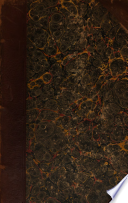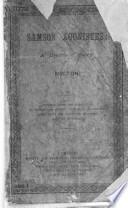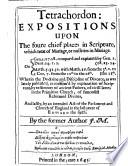“Better to reign in Hell, than to serve in Heaven.”
Variant: Better to reign in Hell than serve in Heaven.
Source: Paradise Lost
John Milton was an English poet, polemicist, man of letters, and civil servant for the Commonwealth of England under Oliver Cromwell. He wrote at a time of religious flux and political upheaval, and is best known for his epic poem Paradise Lost , written in blank verse.
Milton's poetry and prose reflect deep personal convictions, a passion for freedom and self-determination, and the urgent issues and political turbulence of his day. Writing in English, Latin, Greek, and Italian, he achieved international renown within his lifetime, and his celebrated Areopagitica , written in condemnation of pre-publication censorship, is among history's most influential and impassioned defences of free speech and freedom of the press.
William Hayley's 1796 biography called him the "greatest English author", and he remains generally regarded "as one of the preeminent writers in the English language", though critical reception has oscillated in the centuries since his death . Samuel Johnson praised Paradise Lost as "a poem which...with respect to design may claim the first place, and with respect to performance, the second, among the productions of the human mind", though he described Milton's politics as those of an "acrimonious and surly republican".

“Better to reign in Hell, than to serve in Heaven.”
Variant: Better to reign in Hell than serve in Heaven.
Source: Paradise Lost
“The end then of learning is to repair the ruins of our first parents.”
Tractate of Education (1644)
Variant: All is not lost, the unconquerable will, and study of revenge, immortal hate, and the courage never to submit or yield.
Source: Paradise Lost
i.17-26
Paradise Lost (1667)
Context: And chiefly Thou O Spirit, that dost prefer
Before all Temples th' upright heart and pure,
Instruct me, for Thou know'st; Thou from the first
Wast present, and with mighty wings outspread
Dove-like satst brooding on the vast Abyss
And mad'st it pregnant: What in me is dark
Illumine, what is low raise and support;
That to the highth of this great Argument
I may assert th' Eternal Providence,
And justifie the wayes of God to men.
i.254-255
Paradise Lost (1667)
Variant: The mind is its own place, and in itself
Can make a heav'n of hell, a hell of heav'n.
Source: Paradise Lost: Books 1-2
“As ever in my great Taskmaster's eye.”
On his being arrived to the Age of Twenty-three, reported in Bartlett's Familiar Quotations, 10th ed. (1919)
Source: Areopagitica
“I neither oblige the belief of other person, nor overhastily subscribe mine own.”
The History of England, Book ii
Context: I neither oblige the belief of other person, nor overhastily subscribe mine own. Nor have I stood with others computing or collating years and chronologies, lest I should be vainly curious about the time and circumstance of things, whereof the substance is so much in doubt. By this time, like one who had set out on his way by night, and travelled through a region of smooth or idle dreams, our history now arrives on the confines, where daylight and truth meet us with a clear dawn, representing to our view, though at a far distance, true colours and shapes.
“Revives, reflourishes, then vigorous most
When most unactive deemed”
Source: Samson Agonistes (1671), Lines 1687-1692 & 1697-1707
Context: But he, though blind of sight,
Despised, and thought extinguished quite,
With inward eyes illuminated,
His fiery virtue roused
From under ashes into sudden flame,
[... ]
So Virtue, given for lost,
Depressed and overthrown, as seemed,
Like that self-begotten bird
In the Arabian woods embost,
That no second knows nor third,
And lay erewhile a holocaust,
From out her ashy womb now teemed,
Revives, reflourishes, then vigorous most
When most unactive deemed;
And, though her body die, her fame survives,
A secular bird, ages of lives.
Source: Samson Agonistes (1671), Lines 1687-1692 & 1697-1707
Context: But he, though blind of sight,
Despised, and thought extinguished quite,
With inward eyes illuminated,
His fiery virtue roused
From under ashes into sudden flame,
[... ]
So Virtue, given for lost,
Depressed and overthrown, as seemed,
Like that self-begotten bird
In the Arabian woods embost,
That no second knows nor third,
And lay erewhile a holocaust,
From out her ashy womb now teemed,
Revives, reflourishes, then vigorous most
When most unactive deemed;
And, though her body die, her fame survives,
A secular bird, ages of lives.
“Long is the way and hard, that out of Hell leads up to light.”
Source: Paradise Lost
“Never can true reconcilement grow where wounds of deadly hate have pierced so deep…”
Source: Paradise Lost
Source: Paradise Lost
On Shakespeare (1630)
Source: The Complete Poetry
“Yet he who reigns within himself, and rules
Passions, desires, and fears, is more a king.”
Source: Paradise Regained by John Milton
“This horror will grow mild, this darkness light.”
Source: Paradise Lost
“For so I created them free and free they must remain.”
Source: Paradise Lost
“And so sepúlchred in such pomp dost lie,
That kings for such a tomb would wish to die.”
On Shakespeare (1630)
Source: The Complete Poetry
“Freely they stood who stood, and fell who fell.”
Source: Paradise Lost
“How soon hath Time, the subtle thief of youth,
Stol'n on his wing my three-and-twentieth year!”
On His Having Arrived at the Age of Twenty-three (1631)
“Such sweet compulsion doth in music lie.”
Arcades (1630-1634), line 68
Source: The Complete Poetry
“Our state cannot be severed, we are one,
One flesh; to lose thee were to lose myself.”
Source: Paradise Lost
“Where the bright seraphim in burning row
Their loud uplifted angel trumpets blow.”
At a Solemn Music
Source: The Complete Poetry
“Who overcomes
By force, hath overcome but half his foe.”
Source: Paradise Lost
Source: Paradise Lost
“Ah, why should all mankind
For one man's fault, be condemned,
If guiltless?”
Source: Paradise Lost
Attributed to Auguste Rodin in: Leonard William Doob (1990). Hesitation: Impulsivity and Reflection. p. 124
Source: On His Blindness (1652)
“Farewell happy fields,
Where joy forever dwells: Hail, horrors, hail.”
Source: Paradise Lost
“Our torments also may in length of time
Become our Elements.”
Source: Paradise Lost
“They who have put out the people's eyes reproach them of their blindness.”
Apology for Smectymnuus (1642), section VIII
Source: An apology for Smectymnuus with the reason of church-government by John Milton ...
Context: So little care they of beasts to make them men, that by their sorcerous doctrine of formalities, they take the way to transform them out of Christian men into judaizing beasts. Had they but taught the land, or suffered it to be taught, as Christ would it should have been in all plenteous dispensation of the word, then the poor mechanic might have so accustomed his ear to good teaching, as to have discerned between faithful teachers and false. But now, with a most inhuman cruelty, they who have put out the people’s eyes, reproach them of their blindness; just as the Pharisees their true fathers were wont, who could not endure that the people should be thought competent judges of Christ’s doctrine, although we know they judged far better than those great rabbis: yet “this people,” said they, “that know not the law is accursed.”





